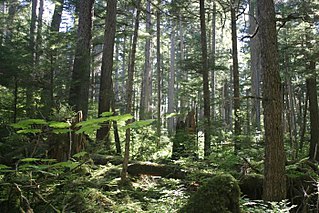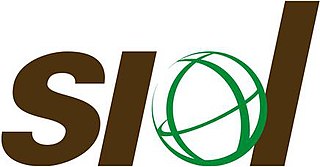Related Research Articles

Sustainable development is an organizing principle that aims to meet human development goals while also enabling natural systems to provide necessary natural resources and ecosystem services to humans. The desired result is a society where living conditions and resources meet human needs without undermining the planetary integrity and stability of the natural system. The Brundtland Report in 1987 defined sustainable development as "development that meets the needs of the present generation without compromising the ability of future generations to meet their own needs". The concept of sustainable development nowadays has a focus on economic development, social development and environmental protection for future generations.

The United Nations Development Programme (UNDP) is a United Nations agency tasked with helping countries eliminate poverty and achieve sustainable economic growth and human development. The UNDP emphasizes developing local capacity towards long-term self-sufficiency and prosperity.

The University of Akureyri was founded in 1987 in the town of Akureyri in the northeastern part of Iceland. It is today a school of health sciences, humanities and social science, and a school of business and science. Over 2000 students attended the university in the autumn semester of 2014, around half of them through flexible learning, making the university the largest provider of distance education in the country. The University of Akureyri coordinates with other Icelandic Universities to operate the University Centre of the Westfjords located in Ísafjörður, which operates two master's degrees, one in Coastal and Marine Management and the other in Marine Innovation. Additionally, The University of Akureyri coordinates with other Nordic Universities for the West Nordic Studies and Polar Law Masters programs.

Public health is "the science and art of preventing disease, prolonging life and promoting health through the organized efforts and informed choices of society, organizations, public and private, communities and individuals". Analyzing the determinants of health of a population and the threats it faces is the basis for public health. The public can be as small as a handful of people or as large as a village or an entire city; in the case of a pandemic it may encompass several continents. The concept of health takes into account physical, psychological, and social well-being.

The exploitation of natural resources is the use of natural resources for economic growth, sometimes with a negative connotation of accompanying environmental degradation. Environmental degradation can result from depletion of natural resources, this would be accompanied by negative effects to the economic growth of the effected areas.

The Millennium Development Goals (MDGs) were eight international development goals for the year 2015 that had been established following the Millennium Summit of the United Nations in 2000, following the adoption of the United Nations Millennium Declaration. These were based on the OECD DAC International Development Goals agreed by Development Ministers in the "Shaping the 21st Century Strategy". The Sustainable Development Goals (SDGs) succeeded the MDGs in 2016.

The French Development Agency is a public financial institution that implements the policy defined by the French Government. It works to fight poverty and promote sustainable development. This public institution is active in Africa, Asia, the Middle East, Latin America, the Caribbean and the French overseas territories, where it finances and supports projects that improve living conditions for populations, promote economic growth and protect the planet.

Environmental policy is the commitment of an organization or government to the laws, regulations, and other policy mechanisms concerning environmental issues. These issues generally include air and water pollution, waste management, ecosystem management, maintenance of biodiversity, the management of natural resources, wildlife and endangered species. For example, concerning environmental policy, the implementation of an eco-energy-oriented policy at a global level to address the issues of global warming and climate changes could be addressed. Policies concerning energy or regulation of toxic substances including pesticides and many types of industrial waste are part of the topic of environmental policy. This policy can be deliberately taken to influence human activities and thereby prevent undesirable effects on the biophysical environment and natural resources, as well as to make sure that changes in the environment do not have unacceptable effects on humans.
The Deutsche Gesellschaft für Internationale Zusammenarbeit (GIZ) GmbH, often simply shortened to GIZ, is the main German development agency. It is headquartered in Bonn and Eschborn and provides services in the field of international development cooperation and international education work. The organization's self-declared goal is to deliver effective solutions that offer people better prospects and sustainably improve their living conditions.

Natural resource management (NRM) is the management of natural resources such as land, water, soil, plants and animals, with a particular focus on how management affects the quality of life for both present and future generations (stewardship).
The Ccatca District is one of the twelve districts in the Quispicanchi Province in Peru. Its capital is the town of Ccatca.

The Ministry of Science and Technology is the central government ministry which coordinates science and technology activities in the country. The office is located in Xicheng District, Beijing. The ministry is responsible for formulating guidelines and related policies for science and technology in China development and promoting basic and special research on science and technology. The Ministry develop human resources, including introducing foreign intellectual planning and organising international scientific and technological cooperation and talent exchanges and strengthening China's innovation capabilities in the field of international scientific research.
Sustainability metrics and indices are measures of sustainability, and attempt to quantify beyond the generic concept. Though there are disagreements among those from different disciplines, these disciplines and international organizations have each offered measures or indicators of how to measure the concept.
There is a long and established framework for water resources management in Colombia. The Environment Ministry and up to 33 Regional Authorities, are in charge of water resources management and policies at the national and regional and watershed level, respectively. Other sectoral ministries are in charge of water demand for energy, water supply and sanitation and water for irrigation.

Ecosystem management is an approach to natural resource management that aims to ensure the long-term sustainability and persistence of an ecosystems function and services while meeting socioeconomic, political, and cultural needs. Although indigenous communities have employed sustainable ecosystem management approaches for millennia, ecosystem management emerged formally as a concept in the 1990s from a growing appreciation of the complexity of ecosystems, as well as humans' reliance and influence on natural systems.

The WISDOM Project is a bilateral research project between Germany and Vietnam, focusing on the creation of a Water related Information System for the Mekong Delta. Initiated by the Vietnamese and the German Government it was started in the year 2007, and is planned to continue until the year 2013. Water-related Information System for the sustainable Development of the Mekong Delta in Vietnam

Pachamama is a goddess revered by the indigenous peoples of the Andes. In Inca mythology she is an "Earth Mother" type goddess, and a fertility goddess who presides over planting and harvesting, embodies the mountains, and causes earthquakes. She is also an ever-present and independent deity who has her own creative power to sustain life on this earth. Her shrines are hallowed rocks, or the boles of legendary trees, and her artists envision her as an adult female bearing harvests of potatoes or coca leaves. The four cosmological Quechua principles – Water, Earth, Sun, and Moon – claim Pachamama as their prime origin. Priests sacrifice offerings of llamas, cuy, children and elaborate, miniature, burned garments to her. Pachamama is the mother of Inti the sun god, and Mama Killa the moon goddess. Mama Killa is said to be the wife of Inti.
A sustainability organization is (1) an organized group of people that aims to advance sustainability and/or (2) those actions of organizing something sustainably. Unlike many business organizations, sustainability organizations are not limited to implementing sustainability strategies which provide them with economic and cultural benefits attained through environmental responsibility. For sustainability organizations, sustainability can also be an end in itself without further justifications.

Water in Africa is an important issue encompassing the sources, distribution and economic uses of the water resources on the continent. Overall, Africa has about 9% of the world's fresh water resources and 16% of the world's population. Among its rivers are the Congo, Nile, Zambezi, Niger and Lake Victoria, considered the world’s second largest lake. Yet the continent is the second driest in the world, with millions of Africans still suffering from water shortages throughout the year.

Strategies for International Development (SID) is a U.S. 501(c)(3) nonprofit that develops, promotes, and applies methods for eradicating rural poverty in Bolivia, Guatemala, and Peru.
References
- ↑ "The history of Pachamama Raymi". pachamamaraymi.org. Retrieved 2014-08-11.
- ↑ "Transboundary Joint Secretariat for the Southern Caucasus, Promoting Cooperation in Nature Conservation". pachamamaraymi.org. Archived from the original on 2014-08-12. Retrieved 2014-08-11.
- ↑ Facing the challenge of the Andean Zone: the role of modeling in developing sustainable management of natural resources R.A. Quiroz, Ruben Dario Estrada, C.U. Leon-Velarde and H.G. Zandstra doi : 10.1007/978-94-011-0121-9_2
- ↑ “Accelerated Change in Fighting Poverty, by Willem H. M. Van Immerzeel” and "Methodology". Archived from the original on 2014-08-12. Retrieved 2014-08-11.
- ↑ "The District Municipality of Ocongate Invites you to participate in the second contest "Pachamama RAYMI" April 3, 2008" (PDF). 22 March 2011. Retrieved 2014-08-11.